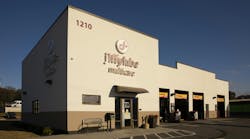As many of us have read in your AOCA updates or TSBs that we receive after the fact, there are several issues that our plaguing our industry due to poor automotive design. As the manufacturers must continually get lighter and lighter to meet the demands of governmental requirements in gas mileage, we are seeing shortcuts taken that if we don’t go an extra, extra step in our compliance, you may soon find yourself shelling out for mistakes on their part. I will go over a few today and share what others have been doing to combat these flaws in design.
The most well-known issue involves the faulty design in the oil pans of Hyundai and Kia. How many of you have paid for an engine already due to a drain plug coming out? What we have been told is that the plug tends to loosen itself up during vibrations from the engine. What one tech told me from a dealership is that the pan itself twists in high temperatures and it allows this movement. While there is no sure-fire way to ensure that this cannot still happen to you, there is one precaution that you can take that could lower this risk. Purchase a torque wrench for your lower bay technicians. There is a set minimum limit that is suggested by the manuals to properly tighten these plugs into place. This has a two-fold effect in that if you implement these into your daily routine, you will see less and less aluminum pan damage claims. You can find these at your local parts house, and they are always usually in stock.
Speaking of aluminum drain pans, I would care to bet that you may have paid for more than a few pan taps to be done due to stripping of these pans because of overtightening. Am I right? As above, a torque wrench set to proper specs will nearly eliminate this issue from happening, other than normal wear and tear. Another issue with these aluminum pans that occurs from overtightening is the dreaded cracked pan. You are not going to just tap that mistake. These pans can range as cheap as $70 to $100 but can be as expensive as several hundreds of dollars. Think about how long it takes a location to earn enough bottom-line income to cover that repair. Now go out and spend $30 and get the torque wrench!
Continuing in the pit, how many of you have had to do something to a Subaru because your tech pulled the wrong plug out of the pan? Guess what! It’s even easier now with the designer deciding to match the plug designs of the oil plug and the transaxle plug. There is a way to combat this possibility and it may only add a few minutes to your service. Purchase and use an oil extractor. These machines suck out the oil from the dipstick tube rather than you having to take down a skid plate or pull a plug out. They are simple to use and can be easily documented on your invoice to notate that you did not remove drain plug, oil removed from above. As a secondary option for aluminum pans, you can use this machine on these engines as well, eliminating the opportunity to strip out that pesky plug. You can get these offline or at a Harbor Freight for a couple hundred dollars or you could reach out to a dealer and get an upgraded system that nears a thousand, but with a lot more bells and whistles.
Finally, we have reached the point in our Ted Talk where we talk about the horrible invention called a canister filter oil cap. You must make sure you put a gasket in the right slot, you must make sure that its seated properly and then that its torqued down correctly. Just give me the tried-and-true spin on filter! The biggest thing that I can suggest for this (other than that torque wrench) is for you do start doing an extended pressure check. Get some flashlights, run the engine up to around 2200 RPMs and watch around the mounting area of the housing. No leaks, then you are good to go! If you happen to crack one of these plastic demons, pay the extra few dollars and replace with the updated design made of metal. You will be doing yourself a favor on future services!
Though we cannot fully avoid all warranties that could occur, because we are all still human, taking an extra step can help you avoid dropping your hard-earned profits on parts that you didn’t have to replace. What other things have you found to be problematic? What tips and tricks do you have to prevent these in your organization. As G.I. Joe used to say, “Knowing is half the battle!”





